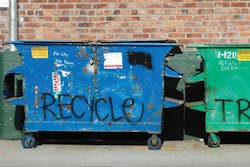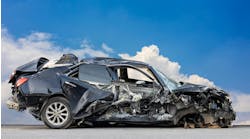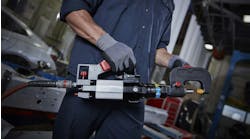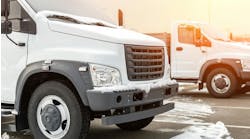As recently as this past summer, Carubba Collision Center’s seven locations required three trash pickups apiece every week. These days, the shops require just one haul each, and that’s every other week. It’s not the recession that’s responsible for less trash; it’s the shop’s new recycling initiative. Masterminded by a recycling consultant that Carubba Collision Corp. president Joe Carubba met through a networking group, the effort is cutting down on waste while bringing in a little extra cash.
“Everything we take off a car gets recycled,” Carubba says. “Every car needs a bumper, and a bumper can fill up a dumpster quite quickly.” Now the multi-location shop, which repairs an average of 1,400 cars each month, boasts a host of recycling bins. Those bins were supplied by the recycling consultant, who walked the shop, noted what could be recycled for cash (the consultant takes a cut of the recycling payments and charges no additional fees), and put the new program in place. When the bins are full, Carubba makes a call and they’re emptied within 24 hours.
Bottom line? Carubba’s now spends $200 less each month at each location for waste removal. Building on that $1,400 savings, the New York–based business brought in $500 in recycling fees in December for the used metal it sold. The recycling revenue fluctuates month-to-month based on the quantity of scrap being sold, as well as how the recycling market is faring. Back in September, for instance, Carubba saw a check for $1,600 for metals, but the recycling market has tightened up a bit since then. Still, for minimal effort, Carubba does right by his balance sheet and by the planet.
More and more, collision repair facilities like Carubba Collision are finding ways to recycle just about everything. Shop owners are finding that their efforts pay big dividends, such as a less toxic work environment, loyal customers and a little extra green in their pockets, too. “In general I think everyone recognizes that there’s a green movement in the industry,” says Robert Stewart, executive vice president of CCar-GreenLink, an environmental information clearinghouse for the auto repair industry operated in cooperation with the U.S. Environmental Protection Agency (EPA). “Everyone wants to know, ‘What do I have to do to be more environmentally friendly?’”
Sorting and Sourcing
Although increased demand is making it easier than ever to recycle, you’ll still have to do a little legwork to connect with the right resources. Owners we contacted for this story mentioned at least a half dozen different agencies or contractors, which varied depending on location. “No one’s made it effortless yet. I’m still waiting for that,” says Mike Beukema, owner of Enviro Auto Plus in Holland Township, Mich., who recycles everything in his mechanical shop except spark plugs (which he’s collecting until someone can recycle them) and talked with us about how collision repair shops can do the same.
Until recycling becomes more fully integrated into waste management in general, here are steps you can take to reduce waste—and save money—in your shop.
Metal
Scrap metal yards and haulers, as well as one-stop recycling companies, pay for metal by type and weight—aluminum, brass, copper, steel, cast iron, light iron, zinc, magnesium—making it a no-brainer to recycle hoods, door panels, rods, bolts and wheel weights. Steve Kurtz, recycling coordinator for Jeff’s Auto Body & Recycling Center in Paxinos, Penn., says his company recycles any kind of metal, from empty paint and aerosol cans to battery cases and wires. The key is setting up a system of separation.
“The more you can divide out the metal, the more money you’ll get,” Beukema says. “If you can get the steel studs off an aluminum wheel, that gives you a straight aluminum price rather than a lower mixed metal price.”
But you don’t necessarily have to sort. Wayne Elhart, president of Elhart Pontiac/GMC Jeep, also in Holland Township, Mich., works with a scrap metal hauler who does the sorting for him. Elhart’s business does annual revenues of $3 million, and employs 18 people in its collision center, which covers 20,000 square feet. Elhart says his company rents the bin and gets a credit for the metal, preferring to have someone else do the labor-intensive sorting.
Depending on local and state pollution regulations, you may have to separate metal from any parts that contain lead, such as battery cable ends, lead wheel weights and soldered components. Some recyclers, such as Kurtz, take lead; some don’t. For more information call your state pollution control agency or county waste management offices.
Paint and Solvents
Switching to waterborne paints, gravity feed spray guns and ultraviolet curing methods dramatically reduces the volume and toxicity of paint waste and volatile organic compound (VOC) emissions. Jacque Andres, owner of Clean Green Collision in Oakland, Calif., and Kurtz of Jeff’s Auto Body say they rely on the Plano, Texas-based company Safety-Kleen, a full-service industrial waste recycler, to empty the paint barrel when it’s full and properly dispose of the waste.
Many companies sell paint solvent recycling machines that save shops money by reducing the amount of solvent they use and the amount of hazardous waste for disposal. The solvent recycler heats excess paint until the liquid portion (solvent) boils. As the vapor cools, it drips into a separate collection tank. Two separate tanks then contain dried paint powder and solvents. “Ours cost between $3,000 and $4,000,” says Andres. “We put the remaining solid paint into 55-gallon drums. The solvents form solid pucks, and we store those. Safety-Kleen picks all of it up.”
How much money could a solvent recycler save? Results will vary, but one shop saved $610 per month ($7,320 per year), according to the Small Business Assistance Program division of the Texas Natural Resource Conservation Commission. The $3,000 recycler reduced paint waste by 30 gallons per month, paying for itself in less than five months.
Plastic
It’s fairly easy to separate No. 1 and No. 2 plastics such as water bottles, jugs, containers, caps, and lids for your local recycling service. Beukema, for example, recycles plastics through level 4. “Just make it easy by labeling everything, especially auto body parts,” Beukema advises. But the higher up you go—through No. 7—the harder it is to recycle plastic, since the higher numbers are a blend of different types of plastic.
Another way to cut back on plastics: Use less to begin with. Elhart makes sure that the shop orders items like windshield solvent in bulk, eliminating a lot of plastic bottles in the process.
A recycler that specifically serves the collision industry may take parts such as plastic bumpers along with metal, cardboard, foam and other materials. John Jury, body shop manager for Phoenix Motor Company—which is now saving about $800 per month on pickup and trash fees—says that Champion Recycling of Phoenix, Ariz., for example, takes bumpers for his company. Check with your parts dealers, as well as with local, county and state recycling resources. Since it is still so tough to recycle a lot of plastic, this is one area where it pays off to network with as many local businesses and environmental groups as you can, Beukema says. “Once you start getting connected, you get more people telling you, ‘I did this,’ or ‘I used this place.’”
Tires
At least 38 states have banned tires from landfills, so many businesses have sprung up to reuse them. In 2003, according to the EPA, 45 million scrap tires were used to make automotive and truck tire retreads. Old tires also can be shredded and used as rubberized asphalt for freeways, in sidewalks and patio decks, or as backfill for landfills. “A tire company picks up our tires and shreds them,” Elhart says. To find out who will take your tires, contact your county recycling agency or ask your local tire dealers.
Glass/Paper/Cardboard/Misc.
Local and county recyclers generally handle glass, paper, cardboard and corrugated cardboard. You may have to call about large pieces. Separate white office paper from newsprint and magazines. Package cardboard and corrugated cardboard with twine unless your local recycler says otherwise.
To recycle odds and ends, try Craigslist (craigslist.org) or other Web sites such as Recyclenet (recycle.net) and B2BFreeZone (b2bfreezone.com). Local businesses might be another resource. “I take Styrofoam and bubble wrap to the UPS store,” Beukema says. “Otherwise I do a Craigslist ad.” Local sculptors or other artists might also be interested in objects you can’t recycle elsewhere.
Both Beukema and Elhart also say they make a point of reusing every scrap of paper they can—writing on the back sides of voided work orders, for instance.
A System That Works
All shop owners contacted for this article stressed how important it is to make recycling efforts as easy as possible for employees to follow in order to maintain them and make them profitable. Beukema estimates he spent about six months networking and setting up his shop into systems optimized for recycling, but emphasizes that any shop can do that a bit at a time.
Once recycling becomes habit, Beukema says, it’s easier to make recycling efforts enhance your bottom line. The less money you spend on waste disposal, the more profit your shop can reap. And Beukema and Andres say the goodwill buzz generated from green practices can’t be underestimated.
“People who do care about recycling are excited to find someone who does it,” Beukema says. “They are loyal customers, and they are well-connected—they keep in touch with each other and share resources.”




